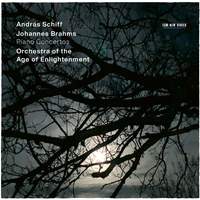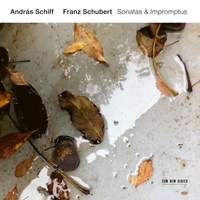Recording of the Week,
András Schiff performs piano concertos by Brahms
Although once famously dismissive of "specialists playing copies of Graf fortepianos", András Schiff is these days no stranger to the use of period-appropriate instruments, having used an 1820 Franz Brodmann fortepiano for his much-lauded albums from 2015 and 2019 of Schubert piano sonatas. Similarly, for his new recording of Brahms's two piano concertos with the Orchestra of the Age of Enlightenment he opts for a Blüthner instrument from circa 1859 (as it happens, the year in which the D minor concerto was premiered).
 Part of his stated mission is to shine a new light onto Brahms's music and to "liberate it from the burden of the – often questionable – trademarks of performing traditions". If I had had any doubts beforehand about whether or not Schiff's desire to "cleanse and detoxify" Brahms would bring with it any loss of power or heft, then I have the horns of the OAE to thank for instantly disabusing me of such a notion: their reassuringly robust roar in the first bar of the D minor concerto immediately sets out the orchestra's stall, offering performances that sacrifice nothing in terms of drama or character.
Part of his stated mission is to shine a new light onto Brahms's music and to "liberate it from the burden of the – often questionable – trademarks of performing traditions". If I had had any doubts beforehand about whether or not Schiff's desire to "cleanse and detoxify" Brahms would bring with it any loss of power or heft, then I have the horns of the OAE to thank for instantly disabusing me of such a notion: their reassuringly robust roar in the first bar of the D minor concerto immediately sets out the orchestra's stall, offering performances that sacrifice nothing in terms of drama or character.
Although the word concerto itself has its etymological roots in the idea of a battle between soloist and orchestra, there's no quarrelling over anything here: everything is perfectly blended, and the piano never has to fight to be heard, thanks to many factors including of course the choice of instrument but also the sensitive playing of the orchestra, overseen by Schiff who directs from the keyboard. The benefits are everywhere, notably during the piano's first solo passage in the D minor concerto, where the interjected notes from trumpets and timpani which are normally lost in performance are entirely audible here. Not only that, but more importantly the reason for them being there in the first place suddenly becomes understood as they help to shape the nuances and contours of the piano melody.
There are many other places in both concertos where this holds true, not least the second movement of the B flat concerto, where off-beat accents for horns and lower strings that often barely register come across loud and clear, substantially altering the mood of the movement. A similar case occurs in the last movement, where there is no difficulty whatsoever in hearing the piano's triplets that accompany the swirling, chromatic melody for woodwinds and strings about a minute into the movement. If I had to be picky then I might say that in some of the double-octave passages I slightly yearned for the brute force of a modern Steinway, but then Schiff's whole point of doing it this way is to strip the music of all of its accumulated performance traditions, and what the Blüthner piano may lack in oomph is more than made up for by the mellow smoothness of its tone and the clarity of textures across the various registers of the instrument.
This warmth is pleasingly complemented by the orchestral playing, particularly in the second movement of the D minor concerto (with Schiff again eschewing traditions by choosing a much more flowing tempo than is customary), where the richness of the bassoons contrasts delightfully with the somewhat veiled huskiness of the muted strings. This beauty of timbre also pays off in the third movement of the B flat concerto, with some exquisitely lingering moments for piano and clarinets, and elegantly expressive cello solos. I was really surprised by how much this recording changed the way I both heard and thought about these concertos. Not only are they excellent performances, but as for Schiff's aforementioned intentions, I would say: mission accomplished!
András Schiff (piano/director), Orchestra of the Age of Enlightenment
Available Formats: 2 CDs, MP3, FLAC, Hi-Res FLAC
András Schiff (fortepiano)
Available Formats: 2 CDs, MP3, FLAC, Hi-Res FLAC
András Schiff (fortepiano)
Available Formats: 2 CDs, MP3, FLAC, Hi-Res FLAC





